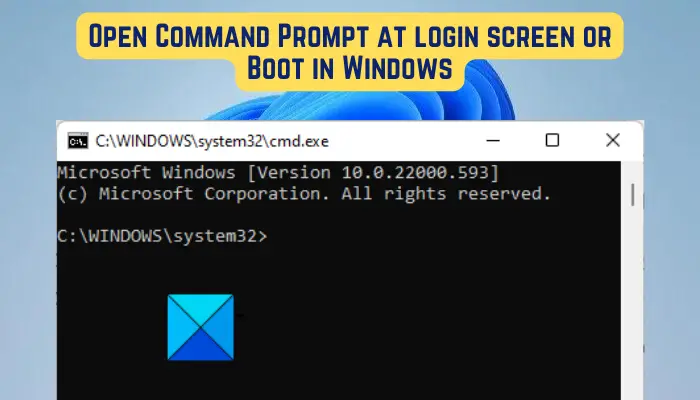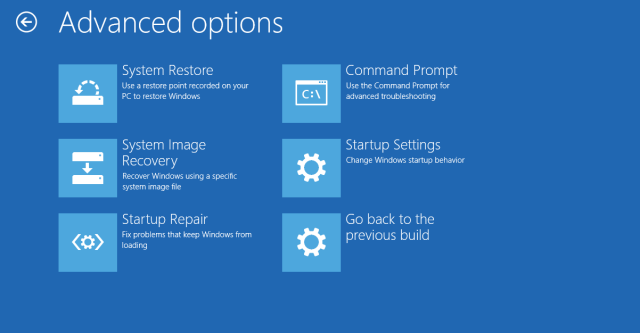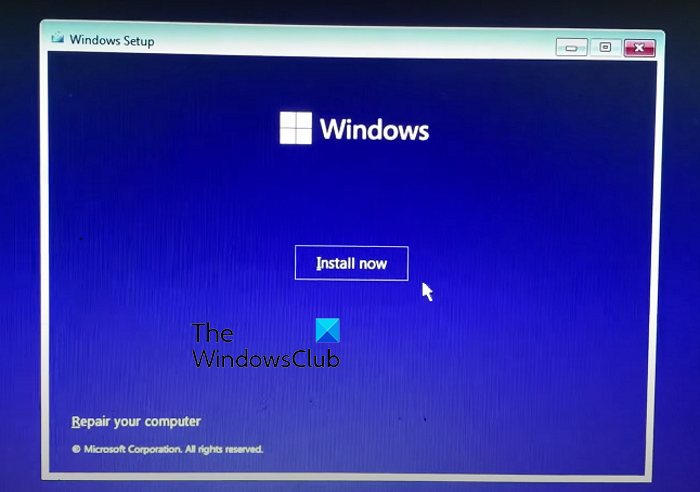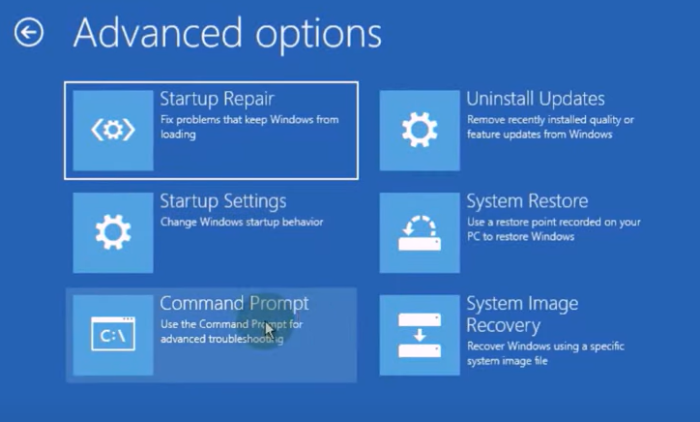In this post, we will learn how to open the Command Prompt window at the Login screen or Boot on your Windows PC. Command Prompt (cmd.exe) is the default command line interpreter for Windows. It is faster than regular GUI and uses less memory. If you have a slow processor and know commands to perform specific tasks, it is better to work with CMD. It only needs a keyboard to work. Just execute the command and get your work done.
Command Prompt is very helpful when the system hangs or gets slow while doing critical jobs on the computer. It is also very useful for troubleshooting or fixing several Windows errors. You can even repair the damaged and missing system files and restore system health by performing SFC, and DISM scans through CMD. There are a lot more tasks that you can do through Command Prompt.

Now, a lot of users want to open CMD right at the login screen or boot screen. There can be various reasons why you may want to open the Command Prompt on your login screen or while booting the system. The reasons can be as follows:
- Repairing is the most common reason to have the Command Prompt window on the boot screen or login Screen. You can repair Windows using simple commands in CMD.
- A Windows error that might pop up at the login screen can be fixed with Command Prompt.
- Data recovery is another reason why users want to open the Command Prompt while booting. Cmd is extremely helpful when you accidentally or permanently deleted the data, and you want to recover that data.
There might be some other reasons for running Command Prompt on the login screen and boot screen. Now, the question arises how can we do that? To answer your question, we have created this post. Here, we will be discussing different methods that you can use to open and use Command Prompt on the login screen or boot screen. So, without much ado, let’s check out the methods.
How to open Command Prompt at login screen or Boot in Windows
1] To open Command Prompt at the Login Screen

Command Prompt can fix various issues and errors which hinder the usual working of a computer. For example, the computer might crash right after the login screen. Or, Windows freezes at the login screen due to system corruption. So, you can use CMD on the login screen to perform an SFC/ DISM scan, boot the PC in safe mode, etc.
Here are the steps that you can follow to run Command Prompt at the login Screen:
- To boot Windows directly to Advanced Startup Settings screen, press and Hold the ‘SHIFT’ key on your login screen, and simultaneously click on the POWER button from the bottom right corner and select the Restart button. Or, simply go to the Power button on your sign-in screen, hold the SHIFT key, and choose the Restart option. Windows will now start in the Windows Recovery Environment (WinRE) environment
- Now, you will see the “CHOOSE AN OPTION” screen. From here, simply tap on the ‘TROUBLESHOOT’ option.
- After that, select ADVANCED OPTIONS on the next screen.
- On the Advanced Options menu screen, simply click on the Command Prompt option.
- PC will now be restarted. You might also be asked for the administrator password; choose your account and enter the correct password.
- The Command Prompt window will open as an administrator with the “C:\windows\system32\” path.
You can now enter the commands to repair the computer or fix some particular kind of error in CMD, or for any other task that you want to perform.
Read: How to run CMD command on startup automatically?
2] To open Command Prompt at the Boot Screen
You can also directly boot to Command Prompt. For running CMD from the boot screen, there are different methods. We have got two methods that you can use. Here are those methods:
- From bootable devices like USB or DVD.
- From the Internal BIOS menu.
A] From bootable devices like USB or DVD
Here are the steps to open CMD at the boot screen using a bootable device/ Windows installation media:
First, boot your computer using a bootable USB drive or DVD. Now, press F10 or “Shift + F10” or the ESC key to open the boot menu. After that, choose a USB drive or DVD as a bootable device.

Once the Installation USB or DVD gets loaded, on the Install NOW window, click on Repair your computer in the bottom left corner of the window or simply press R.

Now, tap on Troubleshoot option on the next screen. Next, go to the Advanced options in Troubleshoot Menu and then click on Command Prompt.
Then, the Command prompt will start, and you can repair a non-working computer using commands.
See: Command Prompt not working or opening in Windows.
B] From the Internal BIOS menu
You can open the Command Prompt window at the boot screen from the internal BIOS settings. Here’s how:
- First, while the computer is booting, quickly press the F8 key to open the Advanced startup menu.
- On the Advanced options screen, simply select the Command Prompt option to open it.
You can now start typing commands with which you want your PC to get repaired or do anything you want.
Why is CMD opening on startup?
If Command Prompt keeps opening at system startup, cmd.exe might be enabled in your Task Manager. So, disable it and then see if the issue is fixed. It might also be the case that your computer is infected with a virus or malware. Hence, run an antivirus scan and remove the potential threats. Besides that, corrupted or missing system files can also cause the issue at hand. In that case, you can simply run the SFC scan to repair system files.
Can you boot in Safe Mode with CMD?
Yes, you can boot into safe mode using Command Prompt. You just have to enter a specific command to do that. Simply, open the Command Prompt window as an administrator. After that, type and enter the bcdedit /set {current} safeboot minimal command in CMD and your PC will be rebooted in safe mode. If you want to reboot in safe mode with networking, enter the bcdedit /set {current} safeboot network command.
Now read: Can’t run Command Prompt as an administrator in Windows.